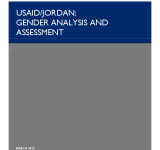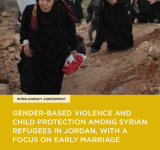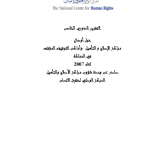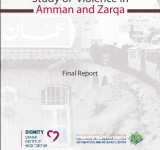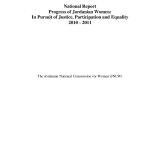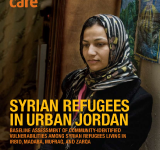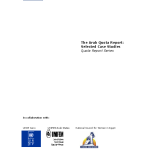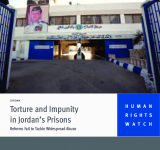The report presents an up-to-date analysis of gender disparities in Jordan to inform development assistance programs by the USAID for the 2013-2017 strategic plan. The assessment report is prepared by the Global Health Technical Assistance Project;; funded by USAID Jordan and therefore;; it is based on a literature review and field work of the 21 focus group discussions held in Amman;; Irbid;; Tafileh and Zarqa. The report establishes that Jordan has begun to transition to a knowledge-based economy with the national advantage as its people. It also points out that despite the investments that have helped address gender equality issues;; Jordan continues to bear low female participation in the labor markets;; gender stereotypes about the role of females and males and conservative cultural norms. The report includes a sector-by-sector analysis;; recommendations;; gender review and an illustrative implementation plan. It concludes with key recommendations on the wide breadth of the USAID Jordan portfolio with a key emphasis on gender issues.
assistance
This report is the product of a meeting between The Ministry of Planning and International Cooperation (MOPIC) and the United Nations team regarding displaced Syrians in Jordan. It assesses the overall situation;; along with the humanitarian needs and coping mechanisms of Syrians in Jordan;; and provides a framework for relief interventions.
لقد تم إعداد هذا التقرير الخامس حول أوضاع مراكز الإصلاح والتأهيل من اجل تقييم هذه المراكز والنزلاء واماكن التوقيف والموقوفين;; وكما يكشف التقرير عن مواطن الضعف والخلل التي تعاني منها هذه المرافق. وتم الاستناد على منهجية الزيارات الميدانية الفجائية إلى تلك الاماكن;; والالتقاء بالنزلاء والموقوفين;; وكما استند التقرير أيضاً على الالتقاء بنزلاء وموقوفين سابقين وأسر بعض النزلاء الحاليين ونشطاء من المجتمع المدني.
تهدف الدراسة إلى البحث في مدى انتشار العنف;; والاتجاهات والمفاهيم حول العنف في المحافظتين الأردنيتين الأكبر من حيث الكثافة السكانية: العاصمة (عمّان) والزرقاء. ولا يقتصر هذا التقرير على البحث في درجة انتشار العنف في هاتين المحافظتين وفي طبيعة العنف (بما يشمل العموامل الجسدية والنفسية والاقتصادية);; وإنما يحاول أيضاً تكوين فهم لأسباب هذا العنف من خلال تحديد القضايا المتشابكة التي تؤدي إليه وكيفية ارتباط هذه القضايا مع بعضها البعض.
This national report is designed to trace the progress of women in various fields;; monitoring achievements;; and highlighting gaps and failures;; as well as analyzing indicators;; recommending measures;; and measuring levels of achievements in the implementation of plans and strategies. The main themes were selected according to national priorities dictated by each stage: Legal Protection for Women's Right to Access Justice;; Participation;; the Economic Empowerment of Jordanian Women;; Equality;; Citizenship and Decision-Making in Public Life. The conclusions of this report confirm that a much smaller effort was exerted at the level of providing information;; data and the provision of services in the area of providing justice and facilitating ways of achieving it. The lack of knowledge about available services among women;; whether provided by civil society organizations or government institutions;; affects women's ability to access justice negatively. Regarding the economic participation the Policies and plans that targeted empowering women economically show that the result of these policies was weak and limited. Difficulty of women’s access to job opportunities in the private sector and inequitable pay between the sexes;; lack of supporting services to working women;; including childcare Facilities;; poor matching between education outputs and skills required in the labor market and the traditional social standards that contribute to directing females towards certain professions. The report proposed general recommendations and directions that include quick solutions to deal with the main highlighted challenges.
This report is a baseline assessment of community-identified vulnerabilities among Syrian refugees living in Amman;; Irbid;; Madaba;; Mufraq;; and Zarqa. The purpose of this report is to identify urban Syrian refugees’ current coping mechanisms and any gaps in services available to Syrian refugees in Jordan. The research methodology is both qualitative and participatory in design;; drawing from the UNHCR tool for Participatory Assessment in Operations. This report presents only the data from household interviews;; baseline assessment;; and the follow-up focus groups conducted with community members. The number of households surveyed was 240;; with a total number of 1;;476 household members and 89 focus group participants representing 534 household members. The report proposed general recommendations and interventions to deal with the main highlighted challenges (cash assistance;; strengthening community links;; vocational training;; physical activities ...etc).
This report was compiled from the findings and case studies presented at a workshop held on 5-6 December 2004;; in Cairo Egypt. This report contains an overview on global trends and regional analyses;; implementing legislated quotas for women;; quota adopted by political parties;; methods on enhance women’s participation;; and the role of the international community and international instruments. The international IDEA had convened a series of regional workshops to gather qualitative data. The report also has 6 case studies about women’s participation and quota include comparative experiences with quotas;; address the culture challenges to women’s representation in the Arab world;; and point the opportunities that could be seized in order to meet those challenges.
جاء هذا التقرير في 68 صفحة يوثق مزاعم قابلة للتصديق بالمعاملة السيئة;; التي عادة ما ترقى إلى التعذيب;; وتقدم بهذه المزاعم 66 سجيناً من بين 110 سجناء تمت مقابلتهم عشوائياً في عامي 2007 و2008;; ومن كل السجون السبعة التي تمت زيارتها من بين سجون الأردن العشرة. ويتضح من أدلة هيومن رايتس ووتش أن خمسة مدراء سجون شاركوا شخصياً في تعذيب المحتجزين.
